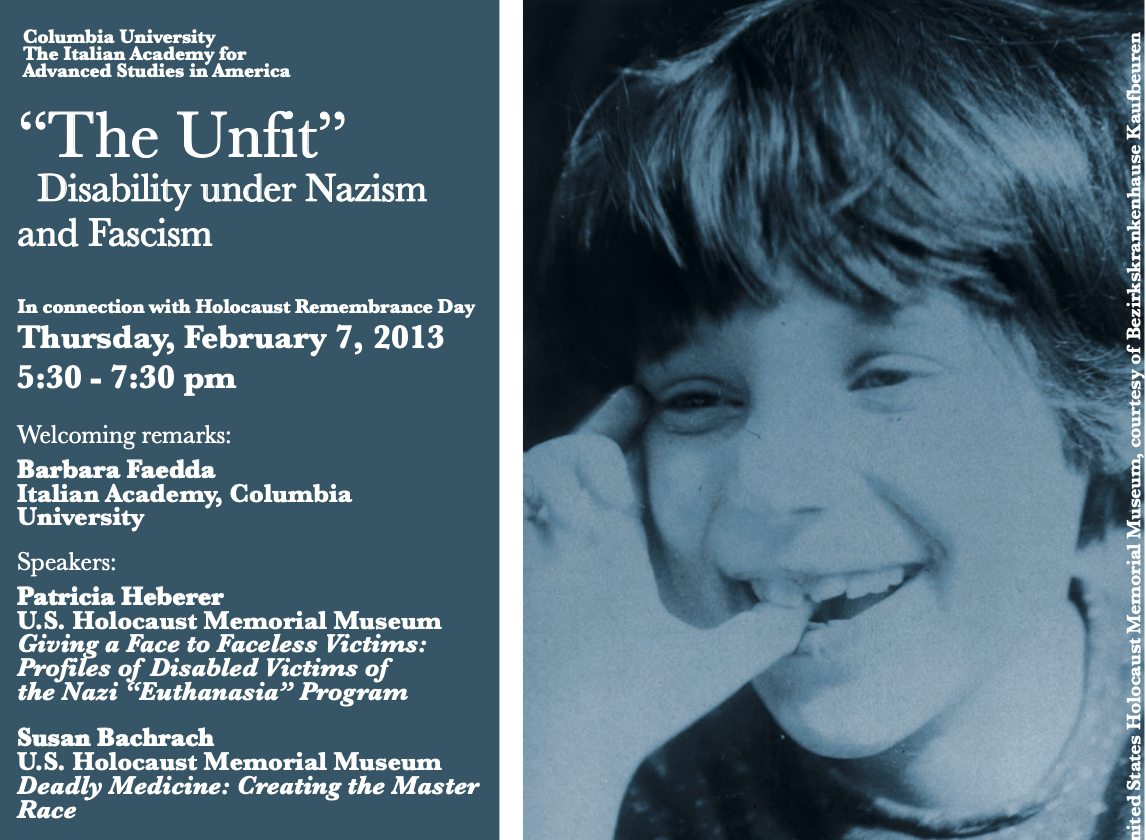Welcoming remarks:
Barbara Faedda
Italian Academy for Advanced Studies, Columbia University
Speakers:
Patricia Heberer
United States Holocaust Memorial Museum
Giving a Face to Faceless Victims: Profiles of Disabled Victims of the Nazi “Euthanasia” Program
Susan Bachrach
United States Holocaust Memorial Museum
Deadly Medicine: Creating the Master Race
David Forgacs
New York University
Photographing Places of Social Exclusion
Europe and the United Nations commemorate the victims of the Shoah each winter on the date of Auschwitz's liberation in 1945, and the Italian Academy marks Holocaust Remembrance Day with an annual academic event exploring issues of discrimination and crimes against humanity. In past years, the Academy has broadened its focus to explore other minority groups that were targeted by the Nazi and Fascist regimes, and that suffered and died along with the millions of Jews: the Roma and Sinti (or Gypsies) in one case, and homosexuals in another. Persons with disabilities were subject to persecution as part of radical public health policy aimed at excluding hereditarily “unfit” Germans from the national community. According to the Holocaust Memorial Museum, “these strategies began with forced sterilization and escalated toward mass murder. The most extreme measure, the Euthanasia Program, was in itself a rehearsal for Nazi Germany’s broader genocidal policies.”
Susan Bachrach is Curator of Special Exhibitions at the United States Holocaust Memorial Museum in Washington, D.C. In this capacity, she is involved in all phases of select special exhibitions at the Museum, including the historic research, identification of artifacts, design, and creation of accompanying publications. She is currently working on a new exhibition, Some Were Neighbors: Collaboration and Complicity in the Holocaust, that will open at the museum this April. Her last exhibition, Deadly Medicine: Creating the Master Race, is presently traveling to universities and other venues across the country. Since joining the Museum in 1992, Dr. Bachrach has worked on many exhibitions, including Liberation 1945 and NAZI OLYMPICS Berlin 1936. She has written or co-edited a number of exhibition catalogues, including Deadly Medicine, NAZI OLYMPICS Berlin 1936, and most recently, Nazi Propaganda.
Patricia Heberer has served as an historian with the Center for Advanced Holocaust Studies at the United States Holocaust Memorial Museum in Washington since 1994. There she serves as a Museum specialist on medical crimes and eugenics policies in Nazi Germany. Dr. Heberer earned her baccalaureate and master’s degrees from Southern Illinois University; she pursued doctoral studies at the Free University of Berlin and the University of Maryland, receiving her Ph.D. from the latter institution. In addition to contributions to several USHMM publications, she has recently authored a source edition, Children during the Holocaust, a volume in the Center’s series, Documenting Life and Destruction, appearing in 2011. A further publication, Atrocities on Trial: The Politics of Prosecuting War Crimes in Historical Perspective, co-edited with Juergen Matthäus, appeared in 2008 with the University of Nebraska Press.
David Forgacs holds the Guido and Mariuccia Zerilli-Marimò Chair of Contemporary Italian Studies at New York University. His publications include Mass Culture and Italian Society from Fascism to the Cold War (with Stephen Gundle, Indiana University Press, 2007) and Italian Culture in the Industrial Era (Manchester University Press, 1990). His latest book, Italy's Margins: Photography, Writing and Social Exclusion since 1861, will be published by Cambridge University Press in 2013.
Remembrance Initiatives at the Academy since 2008
